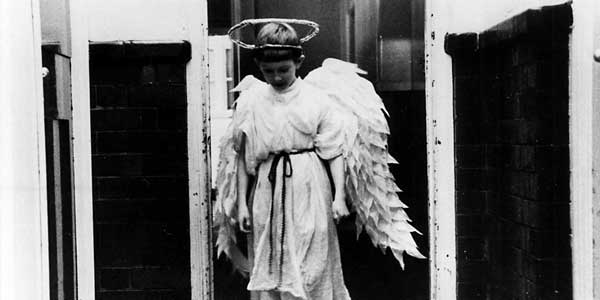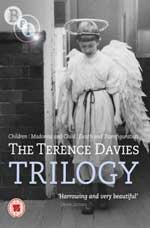
Director: Terence Davies
Running Time: 100 mins
Certificate: 15
Release Date: Available on DVD

Terence Davies recently returned to the director’s chair after an 11 year gap with The Deep Blue Sea, but he started out behind the camera with this trilogy of short films made in the late 70s and early 80s. Together the three short films make an intriguing piece, with each film having its own style but following the same central character at different stages of his life, from childhood to death, with a heavy interest in the nature of memory.
The trilogy kicks off with ‘Children’, about a young adolescent boy called Robert Tucker. The film show us vignettes of his life as an outsider at his school, as well as his burgeoning sense that he may be gay. At home his father is presented as a strange and rather terrifying presence, with Robert having conflicting feelings about his death. ‘Madonna and Child’ sees Robert as a middle-aged man, still living his mother (who he’s devoted to) and working in a dead end job. His life is one of depression, drudgery and sneaking out to fulfil his homosexual desires in dank, hidden places. The final part of the triptych is ‘Death and Transfiguration’, with Robert now an old man (in the form of Wilfrid ‘Steptoe’ Brambell, no less) on the verge of death. He remembers himself at different stages of his life, from being a child through the death of his mum and on to his own end.
Made at a time when gay cinema was in its infancy (although Davies is always keen to stress he’s a filmmaker who is gay rather than a gay filmmaker), it’s a fascinating piece with a very distinctive voice. Davies has always had a rather fractious relationship with life and more particularly his sexuality, and the heavily autobiographical trilogy is very much the product of someone who grew up in a time when being gay was something shameful and illegal (while the main character ages during the film, the period it’s set in remains the same – seemingly just before homosexuality was legalised).
As well as sexuality and memory, the other main theme of the short films is religion (more specifically Catholicism) and searching for a personal experience of God. Those three things are contrasted against one another in fascinating fashion, including one famous sequence where images from the inside of a church contrast with a voiceover of a man trying to convince someone to tattoo his genitals.
Like much of Davies’ other work, there’s a frustratingly deterministic streak to the film. It seems to stem from the oddly Catholic sentiment that people are on Earth to suffer and that the extent of their free-will is in how well they withstand the tonnes of misery that will inevitably be thrown at them. There’s no sense that perhaps the misery comes because nobody’s even tried to prevent it. Throughout the movie, Robert just has to be miserable because the film seems to think that’s what life is. I’ve always found that while Davies has a wonderful ability to look at and express his feelings about his own life on life, there’s a total lack of objectivity, resulting in a slightly annoying inability to see past the end of his own nose. That said, for piercing into an individual soul (without the ability to try at look at things from any other perspective), he is incredible.
While ‘Children’ and ‘Madonna and Child’ are interesting, I have a feeling this trilogy might have disappeared into total obscurity if it weren’t for ‘Death and Transfiguration’, which is utterly wonderful. Intimate, intense, impressionistic and utterly absorbing, in only 20 minutes it takes in so much about the experience of life from childhood to death, along the nature of memory and experience. It’s a truly incredible piece of film as art, and may well be Terence Davies’ masterpiece.
Overall Verdict: It’s certainly not the sort of film that’s going to be appreciated by those looking for a bit of light entertainment, but if you’re up for intriguing, thought-provoking trip into being gay during a time that’s not that long ago but seems so distant, it’s well worth seeking out.
Reviewer: Tim Isaac





Leave a Reply (if comment does not appear immediately, it may have been held for moderation)